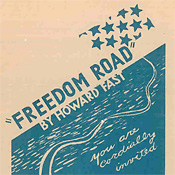Frank Marshall Davis Papers
Finding Aid: Frank Marshall Davis Papers
Repository:
The DuSable Museum of African American History
 Frank Marshall Davis (1905-1987),
poet, journalist, and educator, lived in Chicago from 1924-1928 and
again from 1934-1948. He served as Executive Editor of Claude
Barnett's Associated Negro Press from 1935-1947. A prolific journalist
and arts critic, Davis was also the author of three major volumes of
poetry, Black Man's Verse (1935), I Am the American
Negro (1937), and 47th Street (1948). Active in all arenas
of Chicago's bourgeoning Black cultural scene, Davis was one of the
founding members of the late-1930s South Side Writers' Group associated
with Richard Wright, as well as a prominent participant in events
organized by the South Side Community Art Center and the Abraham Lincoln
Center throughout the 1940s. Davis frequently gave public lectures on
subjects ranging from the political and social status of African
Americans to the history of jazz.
Frank Marshall Davis (1905-1987),
poet, journalist, and educator, lived in Chicago from 1924-1928 and
again from 1934-1948. He served as Executive Editor of Claude
Barnett's Associated Negro Press from 1935-1947. A prolific journalist
and arts critic, Davis was also the author of three major volumes of
poetry, Black Man's Verse (1935), I Am the American
Negro (1937), and 47th Street (1948). Active in all arenas
of Chicago's bourgeoning Black cultural scene, Davis was one of the
founding members of the late-1930s South Side Writers' Group associated
with Richard Wright, as well as a prominent participant in events
organized by the South Side Community Art Center and the Abraham Lincoln
Center throughout the 1940s. Davis frequently gave public lectures on
subjects ranging from the political and social status of African
Americans to the history of jazz.
The ephemera, scrapbooks, and serials in the DuSable Museum's Frank Marshall Davis Collection particularly showcase Davis's presence in Chicago's South Side community. This poster advertises Davis's 1944 book review lecture of Howard Fast's novel Freedom Road at the Carver Club for returning servicemen, opened the previous year. Other collection highlights include rare serials from the 1940s; other ephemera chronicling Davis's speaking engagements; and manuscripts of his autobiography Livin' the Blues and correspondence concerning its publication.









